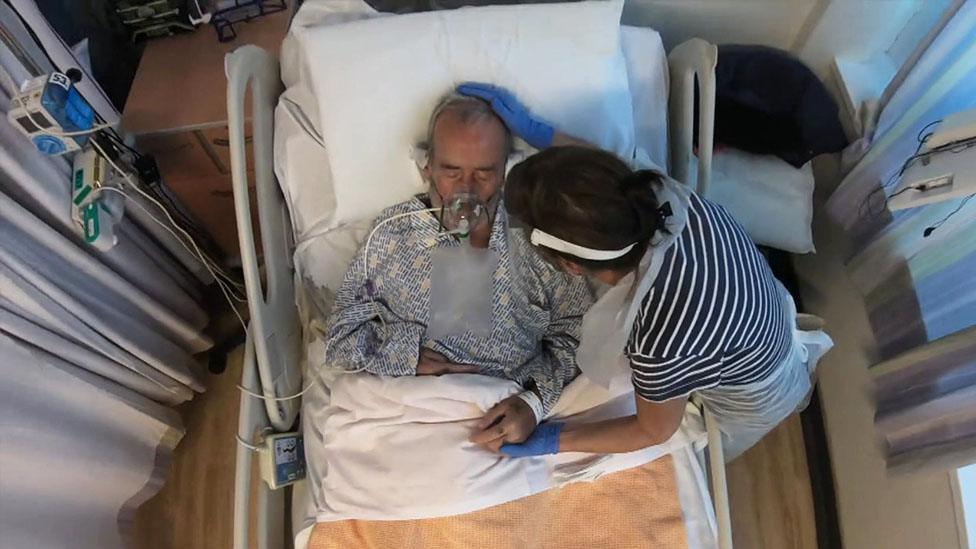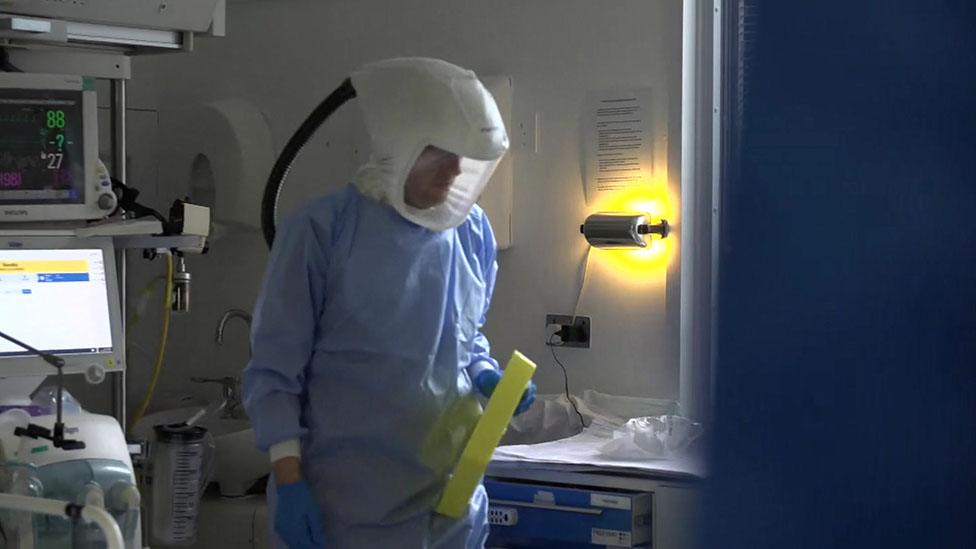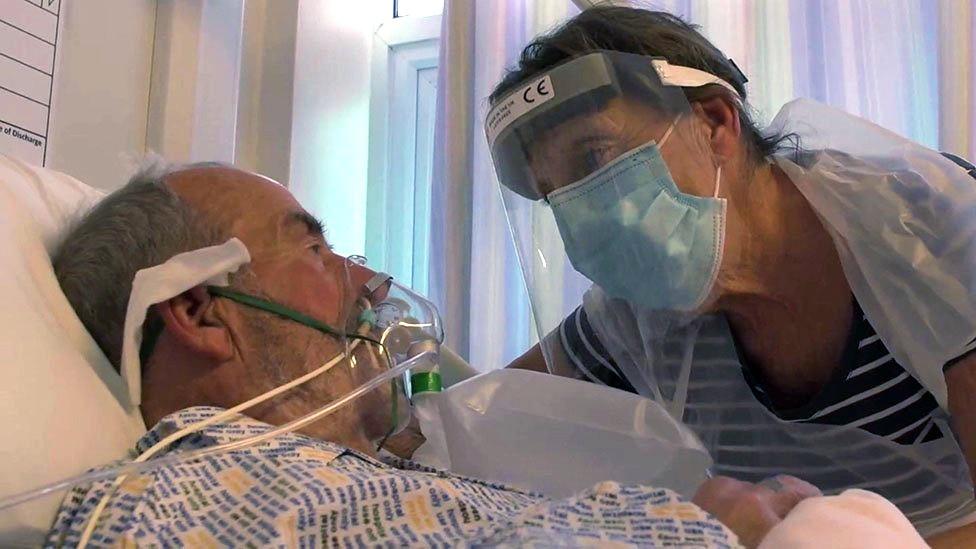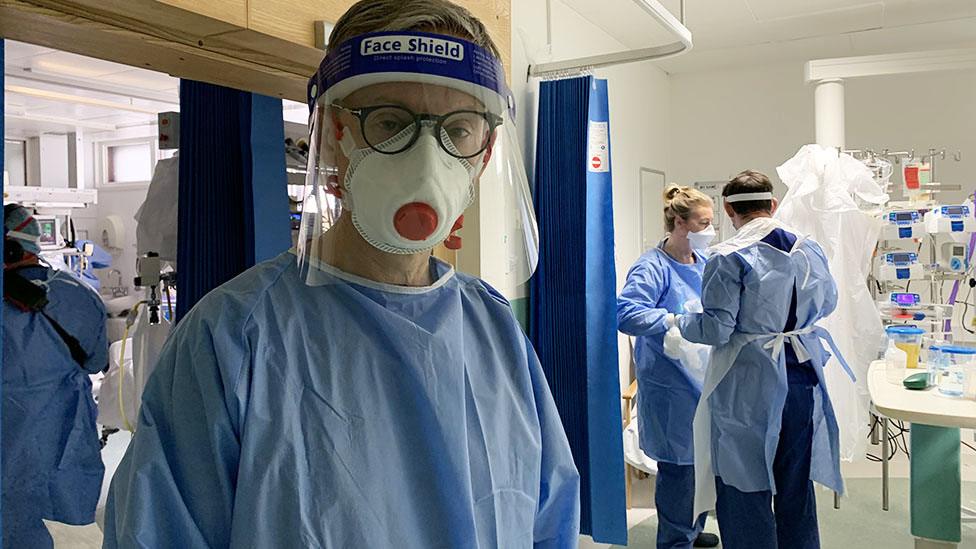Covid: 'We are hanging by a thread' - hospital doctor
- Published

Covid patient Harry King, who has double pneumonia, with wife Diane
If you want to know why England is going into lockdown, Liverpool's intensive care units may help give you the answer.
They are struggling to cope.
"We are hanging by a thread," says Dr Oliver Zuzan, divisional medical director at the Royal Liverpool Hospital.
He is speaking to me in a six-bed intensive care unit, reserved for non-Covid patients. At least here there's no requirement for the staff to spend their shifts in full PPE, with tight-fitting masks that dig into their faces. Here it's just an apron, gloves and surgical mask.
The intensive care unit has had to be split into Covid and non-Covid areas. In the side rooms, patients wait for a diagnosis that will determine whether they are cared for in a red zone (Covid) or green zone (non-Covid).
"People are right to say that these are pressures that occur every winter, but this time it's just a lot worse. This is winter plus, plus, plus," says Dr Zuzan.
As such, it is a glimpse of what hospitals across England could look like if cases of coronavirus continue to rise unchecked - a scenario the new lockdown is designed to prevent. Liverpool University Hospitals Trust, which includes Royal Liverpool and three other hospitals, has 463 Covid in-patients, 73 more than the peak of 390 in early April.
We're very close to the limits of what Liverpool hospitals can cope with
A key difference between the spring and now is the additional medical demands.
Back then, there was little demand for intensive care from non-Covid patients. Many people with urgent conditions stayed away. Half the trust's beds were empty. Now they are about 95% full.
Like other hospitals, there are plans to expand capacity to look after critically ill patients. But that depends on having enough staff. Sickness levels are about three times normal levels. Having dealt with the first wave, and then spent the summer trying to catch up with surgery that was postponed, the medical teams are looking at months of sustained pressure.

Full PPE in the intensive care unit
The critical care units are depending on nurses who usually work in operating theatres. Their skills are similar, but not the same. The units are relying on nurses like Marie Brady, who has come out of retirement to rejoin the ICU team she worked with for 30 years.
"A lot of the NHS is working on goodwill. And unfortunately, people are starting to get tired and exhausted now. I'm 58 now and I'm looking after patients that are my age or a year or two older or even younger than me. And it does make you very aware of your susceptibility," she says.
I have never ever been so ill in all my born days - this is an absolute crippler
I spend most of the morning in the ICU red zone. My first impression is how different this is to Newcastle's Royal Victoria Infirmary which I visited the week before. There, the unit was flooded with natural light. It was not that busy, and several patients were able to chat to me.
In Liverpool, the only ICU patient who appears well enough to talk is Douglas Thom, a former bus driver and crane operator. The 73-year-old is sitting up in bed, his head covered with a domed plastic hood that enables oxygen to flow into his lungs under pressure. It looks like something out of science fiction, but he is stoical.
"It's a bit claustrophobic but it's doing the job, so that's all that matters to me."
Douglas's wife tested positive at the same time as him but recovered.
He takes a dim view of those who dismiss coronavirus.
"All these people who go around saying it's a hoax or a bad cold, they need to get their heads straight because I have never ever been so ill in all my born days.
"This is an absolute crippler."
The trust is not helped by its ageing infrastructure. The Royal was built in the '60s and is crumbling. Its replacement is three years overdue and not scheduled to open for two years. The Royal and Aintree University hospitals have about 40 operating theatres. Half are standing idle since almost all non-urgent surgery has been cancelled.
Staff absence and the need to redeploy nurses from surgery to critical care meant the trust had no alternative.
Even more worryingly, nine urgent cancer operations have been cancelled in the past month.
"It's devastating for the patient," says Dr Tristan Cope, the trust's medical director, "if they've come into a hospital, expecting to have a potentially life-saving cancer operation and that morning are told it can't go ahead."
Dr Cope is speaking in one of the moth-balled operating theatres. We are either side of the operating table. He is worried about the coming weeks.
"We're very close to the limits of what Liverpool hospitals can cope with in terms of the number of patients, particularly - without having to postpone more of those urgent surgical procedures."
About a third of in-patients now have Covid-19
463 Covid positive patients
743 Non-Covid patients
124 Suspected Covid patients
He assures me the cancelled cancer operations are being quickly rescheduled, but adds that whether they take place soon depends on beds being available. It is worth stressing, though, that most cancer treatment is unaffected by coronavirus. I was shown around a brand new cancer centre, near the Royal.
Alison Taylor, an acute oncology nurse consultant, says people with potential symptoms should seek help. "We are open for business. We will investigate and get patients to treatment as quickly as possible. Chemotherapy, radiotherapy and surgery are continuing as normal."
The public may not be clapping for carers anymore, but every patient I meet speaks with reverence about the medical staff treating them, especially the nurses. Staff here understand why so many are tired of limits placed on their lives and livelihoods.
Liverpool was the first part of England to go into "tier three", the highest level of restrictions, on 14 October. Since then, infection rates in the city have declined. But the government's medical advisers have said the measures are not enough to bring the outbreak under control.
"If you don't listen to us, if you don't adhere to those restrictions, you will harm your friends," says Dr Zuzan. "You will harm your family, your neighbours, and you might even harm yourself."

LOCKDOWN LOOK-UP: The rules in your area
SOCIAL DISTANCING: How have rules on meeting friends changed?
SUPPORT BUBBLES: What are they and who can be in yours?
FACE MASKS: When do I need to wear one?
TESTING: How do I get a virus test?

On a Covid ward at Aintree Hospital, I meet Jay Madden who was working on a novel before he was admitted to hospital. The 44-year-old ended up with blood clots on his lungs. Keen to get home to his wife and two children, his breathing is still laboured. A Covid-19 infection is, he says, like a random hand of cards: it could be nothing or you could end up in hospital.
"Keep your mask on, keep your distance and keep yourself clean. You do not want to go through this."
Diane King has been sleeping in a chair at her husband's bedside. Harry, 75, has late-stage Alzheimer's and Covid-19. One cruel condition compounded by another. He has double pneumonia and may have just a few days to live.
"He keeps asking, 'Can we go home?' but we can't because of the oxygen. I'd love to take him home and be at home with him when it happens," says Diane, who couldn't visit for the first 10 days because she also tested positive.
She has brought in old photos - memories of almost 50 years of marriage.
"It's very hard. There aren't any words. I just wish… he could communicate a bit more. But on the other hand, I think maybe he doesn't understand, so hopefully he's not worrying."

Harry King, who may have just a few days to live, is tended to by his wife Diane
Their two grown-up children have been to hospital to say farewell to their dad.
Later that day, when we are back in the hospital foyer, I meet Diane again briefly. She's just popping out for some air. She gives me a big smile. It was humbling to meet them both. A wife dedicated to her husband, determined to care for him and be with him, right to the very end.
The NHS is a cradle to grave service; for the beginning through to the end of life. Boris Johnson says a lockdown in England is needed to prevent a medical and moral disaster. Liverpool is an example of where having to deal with coronavirus, on top of all the usual health demands, has created huge pressures, especially in intensive care.
For the moment it appears to be a unique example of where demand is threatening to overwhelm supply.
Follow @BBCFergusWalsh, external on Twitter
Additional reporting by Nicki Stiastny


I'm the BBC's medical editor. Since 2004 I have reported on a huge range of topics from cancer, genetics, malaria, and HIV, to the many significant advances in medical science which have improved people's health. I've also followed pandemic threats such as bird flu as well as Sars and Mers. Now I'm focusing on Covid-19 and its immense global impact.

